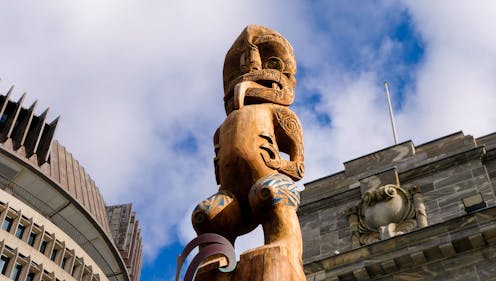The Treaty Principles Bill’s promise of ‘equal rights’ ignores the blind spots of our democracy
- Written by The Conversation

Despite being used in both the Principles of the Treaty of Waitangi Bill and the Regulatory Standards Bill, the term “democracy” is neither defined nor explained in either.
This rhetorical and ideological vagueness obscures a pivotal point: there is no such thing as a singular form of democracy.
The ACT Party is behind both bills, and its leader David Seymour has also justified the Treaty Principles Bill – now before select committee – as upholding and protecting democracy. He asks, “are we a modern democracy where all citizens have equal rights?”.
But democracy takes various forms, and has done for millennia. Derived from the Ancient Greek “demos” (people) and “kratos” (power or rule), the word broadly means “rule by, or power of, the people”. And this can be realised in a number of ways.
The classical Greek form was direct democracy, also known as deliberative or participatory democracy. This involved male citizens participating equally and directly in political decisions.
In contrast, the ancient Roman form was indirect, representative democracy. Representatives elected by eligible citizens made decisions on their behalf. This was the basic model enacted in the 1852 New Zealand Constitution Act, as in most modern democracies.
Other models exist, too. But the point is that democracy is an evolving concept. It’s wrong to assert that any type of governance or decision-making other than our existing system of representative democracy (one person, one vote, underpinned by the rule of law) is undemocratic or anti-democratic.
Tyranny of the majority
Many of the political mechanisms the current government wishes to dismantle – such as Māori wards and consultation processes – were established because of the problems associated with representative democracy.
It is widely accepted that political representation should reflect the different characteristics of a community. But what has been called the “tyranny of the majority” can lead to minorities being constantly outvoted.
Unable to gain representation in proportion to their population, their interests are excluded. In short, it is entirely possible for democracy to be applied in ways that promote inequality rather than equality.
The common interpretation of equality as meaning “sameness” – everybody receiving the same resources and opportunities – underlies the insistence that laws and policies must be applied regardless of individual and group difference. Anything else is unfair or “special” treatment.
However, these assertions overlook the bias of our institutions towards members of the dominant or majority culture, and the unequal outcomes (in health and elsewhere) for Māori people that have resulted in marginalisation and disadvantage.
Correcting that imbalance is a political challenge. As others have argued, “protecting minority rights is an equal characteristic of genuine democracy”.
Tino rangatiratanga and democracy
The term “equity” refers to this recognition of the inequalities that exist between people. Where these inequalities are avoidable and unfair, resources and opportunities need to be allocated to reach an equal outcome.
Achieving health equity for Māori was a key purpose of Te Aka Whai Ora/the Māori Health Authority, prior to its disestablishment.
For Māori, the unfairness extends beyond unequal health and other socioeconomic outcomes. It involves the disregarded guarantees pledged by the Crown in te Tiriti o Waitangi/Treaty of Waitangi in 1840.
These included Māori rights of self-determination, or tino rangatiratanga, which is the source of so much contemporary debate.
Tino rangatiratanga challenges the singular base of power assumed by the Crown, and a “one size fits all” system of representation. But despite claims to the contrary, others argue upholding tino rangatiratanga is entirely possible within the realms of democracy.
The idea of “rule of and by the people” may take many forms, as the work of Matike Mai, the Independent Working Group on Constitutional Transformation, tries to demonstrate.
In proposing constitutional change, Matike Mai describes a sphere of influence based on the Māori-Crown relationship where “conciliatory and consensual democracy” operates.
Difference and equity
It has been argued that te Tiriti is “of its time” and should therefore be subject to reinterpretation. And yet the same argument is rarely made about notions of democracy and equality that have been with us since 1852.
This is relevant to many communities which experience avoidable and unfair health and social inequalities, not only Māori.
In September last year, a Cabinet Office circular required public sector agencies to ensure “services are not arbitrarily allocated on the basis of ethnicity or any other aspect of identity”.
On the face of it, this is a call for fair and equal treatment based on need. But the language suggests difference is about how an individual chooses to identify, rather than how their identity and circumstances cause them to be treated differently in the first place.
As long as this is the case, those differences and their associated needs will always be underserved.







